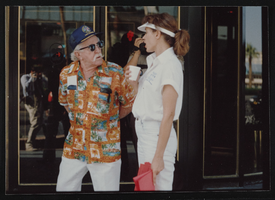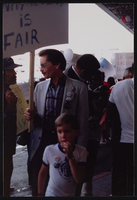Search the Special Collections and Archives Portal
Search Results
Shirley Sandin oral history interview
Identifier
Abstract
Oral history interview with Shirley Sandin conducted by Janice Ledford on March 11, 1978 for the Ralph Roske Oral History Project on Early Las Vegas. In this interview, Sandin discusses her family ancestry and her employment opportunities. She later discusses a fireplug design contest.
Archival Collection
Robert Granger oral history interview
Identifier
Abstract
Oral history interview with Robert Granger conducted by Conrad Langille on February 10, 1972 for the Ralph Roske Oral History Project on Early Las Vegas. During the interview, Granger discusses the different addresses that he has occupied since moving to Southern Nevada in 1951. Granger also mentions his recreational activities, and personal family history.
Archival Collection
Mike Newman oral history interview
Identifier
Abstract
Oral history interview with Mike Newman conducted by Reginald Williams on March 02, 1980 for the Ralph Roske Oral History Project on Early Las Vegas. During the interview, Newman discusses his career writing about gambling in Las Vegas, Nevada. Newman also discusses the gambling environment in the city from the psychology of becoming a gambler to his experience becoming a casino dealer.
Archival Collection
Stanley Goldstein oral history interview
Identifier
Abstract
Oral history interview with Stanley Goldstein conducted by Carol A. Semendoff on October 25, 1979 for the Ralph Roske Oral History Project on Early Las Vegas. This interview covers Goldstein’s personal historical profile as a Las Vegas, Nevada resident. Also during this interview, Goldstein discusses the Strip, gambling, prostitution, and the history of the major casinos.
Archival Collection

Frontier Strike: first arrest, Culinary Union, Las Vegas (Nev.), 1991 September 22 (Folder 2 of 2), image 22
Date
Description
Image

Picket at the El Cortez Hotel, Culinary Union, Las Vegas (Nev.), 1988 April 22 (folder 1 of 1), image 22
Date
Description
Image
Rena Lees oral history interview
Identifier
Abstract
Oral history interview with Rena Lees conducted by Bill Young on March 19, 1978 for the Ralph Roske Oral History Project on Early Las Vegas. In this interview, Lees talks about her experience living in Las Vegas, Nevada from the 1930s to 1950s. She specifically talks about growing up in Las Vegas and the mob's influence throughout the city. She also discusses her family and her career working at Sunrise Hospital.
Archival Collection
Laura Gunning oral history interview
Identifier
Abstract
Oral history interview with Laura Gunning conducted by Mike Martinez on March 5, 1981 for the Ralph Roske Oral History Project on Early Las Vegas. Gunning discusses her life in Las Vegas, Nevada. Gunning first talks about her family background, her church membership, education, and the minimum wage. She also talks about the Las Vegas Strip, the first businesses and markets in Las Vegas, change in climate, and family trips.
Archival Collection
George E. Franklin oral history interview
Identifier
Abstract
Oral history interview with George E. Franklin conducted by Linda Arnone on March 09, 1981 for the Ralph Roske Oral History Project on Early Las Vegas. Franklin discusses his career as an early Las Vegas, Nevada lawyer.
Archival Collection
Clifford Kemple oral history interview
Identifier
Abstract
Oral history interview with Clifford Kemple conducted by Paul Wilkins on April 4, 1976 for the Ralph Roske Oral History Project on Early Las Vegas. Kemple discusses his early life in Goodsprings, Nevada; Las Vegas, Nevada, and changes that he has noticed in Las Vegas.
Archival Collection
